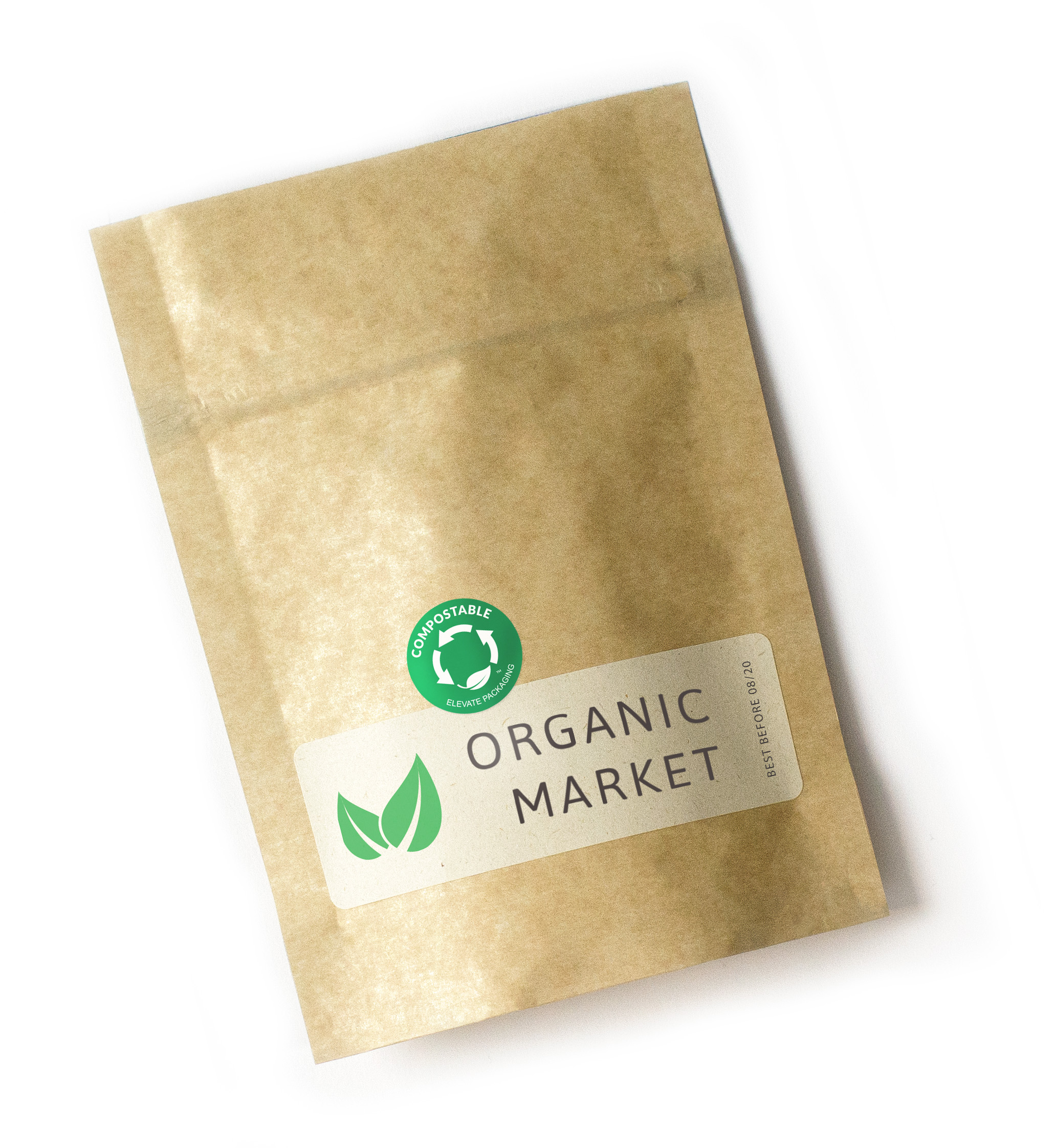- Home
- Sustainability
- Composting Standards
What Makes Our Bags and Labels Compostable?
At Elevate Packaging we believe that in order to make composting mainstream, and to combat misinformation about compostable packaging, it is important to be clear about compostability requirements and certifications. We determine compostability based on FTC guidelines.
Each of our end products, labels, pouches and cello are ASTM D6400 compliant. Each of the raw components that make each of our end products are ASTM D6400 compliant, including the adhesive on our labels, the film for our pouches, the film for our cello bags, the zipper closures on our bags and valves on our coffee bags. The key raw elements that make up these components are bio-resins and wood cellulose. This is evidenced by 3rd party lab testing as required by the FTC to be considered compostable.
Additionally, our products do not contain:
- BPA
- GMO ingredients
- Animal products
Labeling Legislation for Compostable Products and Packaging
How do you Know it is Compostable?
"Marketers who claim a product is compostable need competent and reliable scientific evidence that all materials in the product or package will break down into — or become part of — usable compost safely and in about the same time as the materials with which it is composted.”
- Compostability Claims, FTC Green Guides
In addition to composting standard compliance, we believe that field testing our products is crucial to the success of mainstream composting. While composting standards prove compostability under lab testing conditions, field testing allows us to see how those standards apply to real-world composting situations. This ensures that we not only create products that are compostable, but products that will be composted.
Composting Standards and Organizations
The appropriate certification-type and standards-code may vary by product type, material, or construction. Each product page on our website lists the certifications and standards that apply.
All of our raw materials and components meet FTC, ASTM D6400, and EN13432 standards.
Please visit product pages to view any further standards or certifications that apply to that product. The explanations of those standards and certifications are below.
Standards
Listed below are organizations which provide 3rd party evidence that products are either industrial or home compostable, and the compostable standards by which they validated compliance, all in accordance with the FTC.
AS4736 and AS5810
Australian standards for industrial and home compostability.
ASTM D6400
The US industrial composting standard for a single material or component such as a disposable fork.
ASTM D6868
The US industrial composting standard for a product that includes a laminated or extruded film or coating. This is to account for coated products and ensure the materials remain compostable when additives are included, such as a coated paper plate.
EN13432 and EN14995
The European equivalent of the ASTM standards, defining regulations for compostable plastics.
ISO15985
International standard for products suitable for anaerobic biodegradation
ISO17088
International Standard for products compostable in industrial facilities
N FT 51-800
French standard for home compostability.
Organizations
BPI
A US based organization that officially certifies compostable products meeting ASTM D6400 and ASTM D6868 standards for compostability.
Cedar Grove
Field testing completed by Cedar Grove Compost - A leading compost facility based in Seattle, USA.
CMA
The Compost Manufacturers Association field tests compostable products. They use different types of compost facilities to provide proof of compostablity under varying conditions.
Home Composting
There is not yet an international standard specifying the conditions for home composting of biodegradable plastics, nor is there a home composting standard in the USA.
We encourage customers to include our products in their home compost. Our compostable packaging will decompose in a reasonable time and is non-toxic - resulting in healthy compost to regenerate the soil.
Due to differences in climate and individual home compost bins, time to decompose may vary. The speed and efficacy of composting are largely determined by factors such as: local climate, season, carbon-nitrogen mix, and air circulation. Where possible our founder has personally verified compostability in his own home composting (Illinois, USA).
How to Dispose of Compostable Packaging
Unfortunately, like regular food waste, compostable products will not compost in a landfill. Composting requires the correct combination of materials, oxygen, heat, and moisture. Landfills are bad for the planet and do not provide the right environment for healthy decomposition.

While our products may be an improvement to toxic petroleum-based alternatives, there is still work to do. We are committed to our goal of ending landfills, and accelerating the mainstream adoption of composting.
Why Brands Choose Compostable Packaging
Compostable Packaging is the most sustainable packaging the planet has to offer. Smart, sustainably-minded consumers don’t want to participate in the “Recyclables Myth” or associate with companies that use plastic.
Compostable packaging is the best alternative to petroleum-based plastics. It has a tangible impact at every stage of its lifecycle:
- It begins life as sustainably-sourced wood cellulose and other bio-based resins.
- During its life it is non-toxic packaging for both food and non-food products, ensuring that products are not damaged or wasted.
- At end-of-life it is composted and used to enrich the soil.
With the awareness that compostable packaging creates, you and your customers will be key partners in creating mainstream composting access. Mainstream composting will reverse climate change, end landfills, and bring life to our planet’s neglected soil.
With so many clear benefits, why would you choose anything else?
 Loading... Please wait...
Loading... Please wait...



